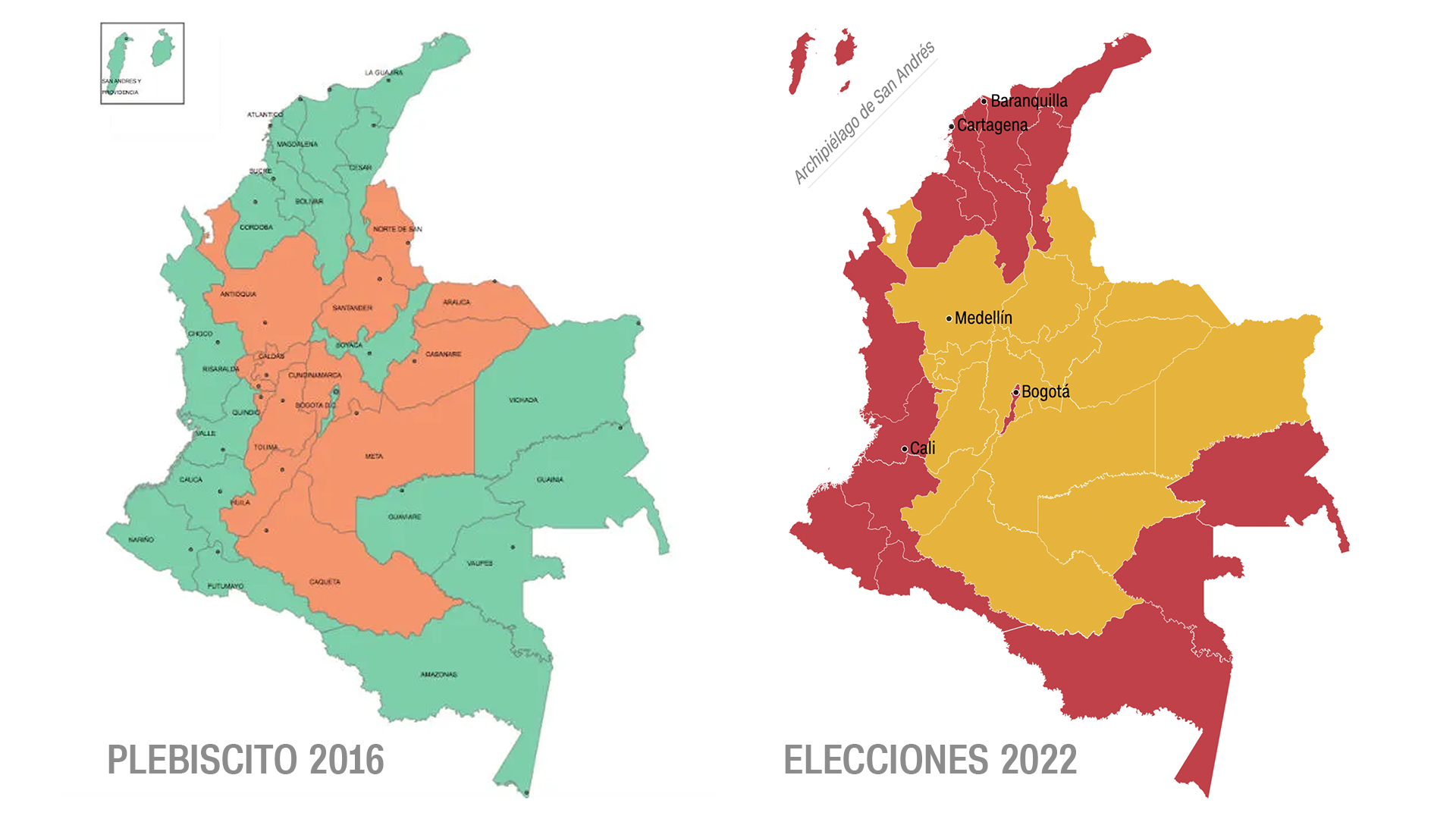Meet Gustavo Petro, Colombia's first leftist president 3:41
(CNN Spanish) --
The map of the elections leaves no doubt: the forgotten of Colombia, and those who voted "Yes" in the plebiscite for peace, were the ones who defined the destiny of the country, which with Gustavo Petro and France Márquez at the helm will have a leftist government for the first time in its history.
"After 214 years we achieved a government of the people, a popular government. The government of the people, of calloused hands, the government of ordinary people, the government of nobodies and nobodies of Colombia," said Francia Márquez in her first speech after being elected vice president, the first black woman to hold the position.
ANALYSIS |
The 5 conclusions of Gustavo Petro's victory
The geographical distribution of the vote for Petro and Márquez seems to prove him right.
The Historic Pact formula was imposed in the capital, Bogotá, and later triumphed in the periphery: the Atlantic coast, the Pacific and the south and southwest of the country.
Petro and Márquez's "victory belt" "is the territory that historically has been the territory that is left behind, the territory where large state investments do not arrive or are delayed, they are the territories where people feel forgotten, in where even today public services do not arrive, as is the case in Chocó," political analyst Augusto Reyes explains to CNN en Español.
The voters there understood "their rights have been vindicated" and that they have a president "who can look at them, who can comply with them."
Map of the results of the elections in Colombia 2022 by departments
Hernández "did not have a program to conquer the Afro vote or the indigenous vote," Eduardo Pizano, a political analyst and former minister, tells CNN en Español.
And he gives the example of Cauca and Nariño, where more than 60% of the population participated in the elections, a percentage around 10 points higher than the country's.
advertising
He also especially points to Petro's triumph in urban areas such as the municipalities near Bogotá, where he prevailed in the majority, and gives the example of Soacha, a municipality of approximately one million inhabitants that has concentrated many displaced people.
"It reached the lower strata much better," he considers.
Fernando Ramos, CNN correspondent in Colombia, explains that Petro and Márquez triumphed in "excluded communities that have not been heard", in a "Colombia that many do not even know" and that has deep problems such as lack of inclusion and opportunities, among others.
In this sense, he points out that while Hernández "disconnected" from the supporters in the last stretch of the campaign and was unable to capitalize on the results of the first round, Petro lived with the voters, visiting departments such as Chocó and Magdalena.
Pizano agrees that Petro had a "more organized" campaign in this last stretch and a "clear strategy" of where he had to look for votes.
"Finally the yes won"
Slide the line in the center of the image to see the comparison between the 2016 plebiscite and the second round in 2022:
"Several voices yesterday said 'the yes finally won' in the sense that in those territories that voted yes (in the 2016 plebiscite) yesterday they had the chance to feel like winners for the president they voted for," Reyes explains. .
In 2016, a deeply divided Colombia voted on the peace agreement with the FARC promoted by then President Juan Manuel Santos.
The "No" won in the plebiscite, and the voters' map then clearly showed that those who remained in the minority, in favor of the "Yes", were those departments that suffered the most from the conflict, the part of the country that has historically been the victim of violence.
The similarity with the geographical distribution of the vote in favor of Petro is evident.
"There's almost a coincidence, it's almost like tracing the same map," says Pizano, explaining the existence of two clearly differentiated groups: those propaz with strong ties to grassroots social movements, which geographically coincide with support for Petro, and the opposite group that at the time was led by Álvaro Uribe and has its prominence in other areas such as Antioquia.
The Francia Marquez factor
Francia Márquez: We are going to eradicate patriarchy in Colombia 3:52
The "symbolic burden" of Francia Márquez, says analyst Augusto Reyes, helped consolidate the vote in favor of Petro, especially in the territory of Cauca.
"Marquez has too strong a symbolic load," she says, explaining that "without being a career politician, her personal trajectory, her cause, her struggle and how she was framed from a very young age until yesterday when she was elected vice president conveys what is a historic struggle" for inclusion.
Francia Márquez, elected vice president of Colombia: "After 214 years we achieved a government of the people, the government of the nobodies of Colombia"
Francia Márquez was a "magnificent candidate" for the Pacific coast, for departments such as Cauca, Nariño, Chocó, for places with populations of Afro descent who felt identified, Pizano said.
That same thing, on the other hand, played against her with the population that could feel very distant from her.
Márquez's candidacy, says Juan Carlos López, CNN's chief Washington correspondent, uncovered that Colombia is deeply racist, a reality that was relegated to classism.
Petro and Márquez won in the areas hardest hit by the armed conflict, the Pacific and the south, and that is where the elected vice president made the difference.
The result is "a message of how things have changed" in Colombia, he explains.
Elections ColombiaGustavo Petro

